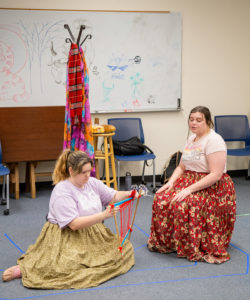
SFA theatre students Ariana Cox-Taylor, left, sophomore from Addison, and Elizabeth Powell, junior from Baytown, rehearse a scene from the SummerStage Festival presentation of “Women Who Weave.” The play opens this year’s festival at 10 a.m. Thursday, June 23, in Kennedy Auditorium. Along with the musical “The Jungle Book Kids,” SummerStage performances run through July 8.
The School of Theatre at Stephen F. Austin State University embraces neurodiversity in its presentation of the play “Women Who Weave,” a feature of this year’s SummerStage Festival. The play’s director, Professor CC Conn, uses the term “neurodiverse” to be “as inclusive as possible” to many various needs. The word neurodiversity refers to the diversity of all people, but it is often used in the context of autism spectrum disorder and other neurological or developmental conditions, including ADHD or learning disabilities. Merriam-Webster defines neurodiversity as “individual differences in brain functioning regarded as normal variations within the human population.”
Addressing this in stage performances is often called “sensory-friendly” theatre, and is typically aimed at providing a comfortable theatre experience for people on the autism spectrum, Conn said.
“I became aware of the practice while attending the Southeastern Theatre Conference in 2019 and have wanted to bring it to the SFA campus since then,” she said. “During my Junior Jacks camps over the years, I have worked with many neurodiverse children, and I really want to be sure their needs are recognized in as many ways as possible. I don’t think enough people are aware of this option, and it is important to educate the community.”
In addition to “Women Who Weave,” a comedy for young adults by playwright J.S. Puller, this year’s SummerStage Festival at SFA also features the children’s musical favorite “The Jungle Book Kids,” based on the novel “The Jungle Book” by Rudyard Kipling and the beloved Disney film by the same name. Conn chose “Women Who Weave for its message about gender non-conforming and stories of strong women. “There is nothing about the play that is specific to neurodiversity,” she said. “I want everyone to have a great experience just seeing theatre.”
But theatre students will be going the extra mile to make the performance inclusive for neurodiverse audiences, Conn said, including creating a “safe room” for audience members who begin to feel a little overwhelmed by live theatre. “There will be ushers wearing brightly colored shirts who can help anyone leave the theatre for the safe room, or the bathroom, whenever needed,” she added.
Students will create a welcome video that does a virtual walkthrough of the theatre to help familiarize people with the experience ahead of time. A mini grant from SFA’s Office of Research and Sponsored Programs will help support the extra materials required by the program, including the purchase of “sensory” bags to provide audience members with materials that can help them better navigate the performance and the space. This includes ear muffs to buffer loud noises, a communication deck (a set of cards with pictures and words used to communicate needs to others), fidget toys and sanitizing wipes, among other items.
Not only will this directorial approach benefit neurodiverse audience members, but it will also serve as a method to educate all theatre patrons who may be unaware of the challenges faced by neurodiverse people.
“That is certainly my goal,” Conn said. “Large theatres in Dallas, Houston and Austin are doing this for their communities, but I have not seen anyone doing this in East Texas. I want SFA to lead the pack. This is an important educational opportunity for the SFA community and the Nacogdoches community. I also look forward to the actors getting this type of experience to add to their skill sets as they leave the university. And, it is a terrific opportunity for our teaching certification students as well.
“It only takes slight changes to make theatre accessible to more people, and we should be doing that as often as we can,” Conn said. “Being aware of the diversity of human needs and allowing for them is paramount to improving the human experience for everyone.”
“Woman Who Weave” will be presented at 10 a.m. June 23, 24, 30 and July 6 and 8; and at 6:30 p.m. June 29 and July 7. The sensory-friendly performances will be presented July 6 and 8 at 10 a.m. and July 7 at 6:30 p.m. “Women Who Weave” is produced by special arrangement with Playscripts, Inc. “The Jungle Book Kids” will be presented at 10 a.m. June 29 and July 1 and 7; and at 6:30 p.m. June 30 and July 1, 6 and 8, and it is presented through special arrangement with Music Theatre International.
General admission tickets for both plays are $15 for adults, $10 for seniors and $5 for students/youth. Pay-what-you-can performances for both shows are on June 30.
All performances are in Kennedy Auditorium, 1906 Alumni Drive, SFA campus. For tickets, call the SFA Fine Arts Box Office at (936) 468-6407 or access finearts.sfasu.edu/purchase. For more information about SummerStage, visit theatre.sfasu.edu.



